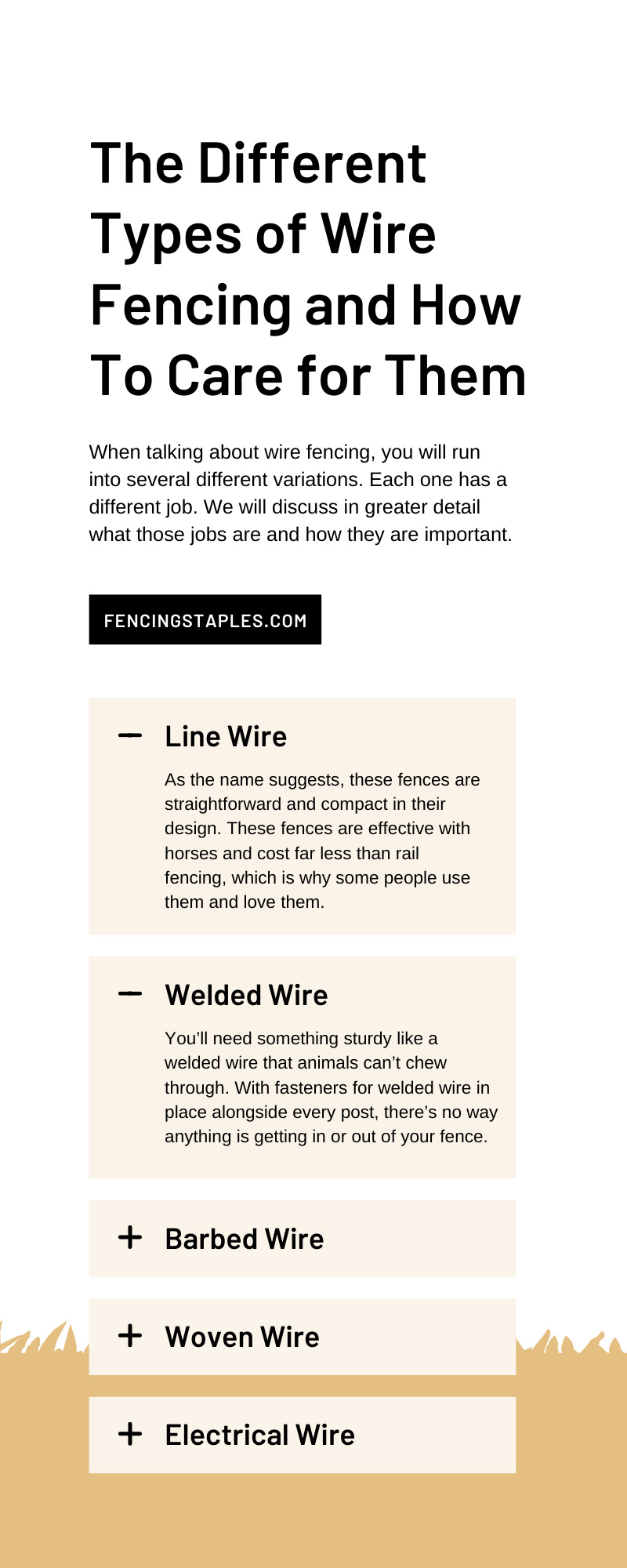No products in the cart.
When talking about different types of wire fencing, you will run into several different variations. Each one has a different job. We will discuss in greater detail what those jobs are and how they are important. Here are the different types of wire fencing and how to care for them.
As the name suggests, these fences are straightforward and compact in their design. They take the place of the traditional rail fence by using tightened wire to stop the horse in its tracks, just like a railing. These fences are effective with horses and cost far less than rail fencing, which is why some people use them and love them. Keep in mind that this style of fencing is very simple in nature and may not keep livestock at bay, with the exception of larger animals that it’s designed to hold, such as horses.
You’ll need something sturdy like a welded wire that animals can’t chew through. Because of their resiliency, they are also hard to dig under, which is another plus for rowdy livestock. It is also a great deterrent for pests that want to get to your livestock while they sleep during the day. With fasteners for welded wire in place alongside every post, there’s no way anything is getting in or out of your fence. You’ll be hard pressed to find a better fence for your money than what you would get with welded wire. The resilience is second to none because the welding is much stronger than woven wire or barbed wire could ever be.
These fences are almost always strictly made for cattle because they attempt to climb fences. With barbed wire, they will not make the leap. As cruel as it may seem, they learn quickly what not to do. You need something to hold back a several thousand-pound animal. It could wreak havoc on your neighbor’s land if you’re not careful. Another benefit to purchasing this style of fencing is that it’s much cheaper because you don’t have to buy as much of it, so a little goes a long way.
This wiring is excellent for smaller livestock like chickens. It will keep them in and predators out. It’s inexpensive because you can get it in smaller gauges. It’s also a fantastic garden option if you want to keep things out of your garden space. Most of this style of wiring is also galvanized to give it extra strength and durability.
For animals that refuse containment, this is an option that will send them the message to corral themselves within the perimeter. Equivalent to static electricity, these fences aren’t aimed to harm but to alert animals. The shock redirects their attention to something else, and they forget about trying to escape.
Apart from minor differences, different types of wire fencing requires the same maintenance. It will take some finesse to keep them in check and functioning correctly.
Make sure that you’re using rust-resistant wire. Most wiring is galvanized aluminum with zinc, which means that it is strong and resistant to the elements. You’ll need this if you want a strong wire fence that will hold up for years without having to repair things every few months.
You will want to ensure grass and weeds don’t grow around your fence. Anyone who has a yard should maintain their fence line. Weeds become problematic for several reasons.
The first is that it skews your line of sight, making it difficult to see the ground behind the grass covering the bottom of your fence. The second is that weeds create a perfect cover or shelter for pests and other animals that might try to dig under or climb your fence at night.
This cover allows the bugs to enter at a higher rate than they would normally without the available camouflage. It also prevents damage to your fence, like rust and rot that can occur from moisture and dirt building up around the bottom of your fence.
The last thing you want is your bushes growing through your fence. You might want to cover your wire, but having your vegetation growing through could damage your fence, trees, and even your bushes.
It could cost you many repairs just to fix your fence. So, make sure that you’re keeping your tree canopies and your bushes nice and neat. This will help in the long run because you will also train your plants how to grow correctly without growing into the fence. Eventually, you won’t have to groom them as much, if at all.
People should always watch their posts. Even though you staked them into the ground, leveled the posts, and anchored them with dirt, rock, and cement, they can still erode or rot and lean, split, or break off altogether.
So, you must keep a close eye on your fence posts. One way of doing this is by conducting a walk-through inspection. Look at them closely, push against them to see how resilient they still are. If you notice that they look a little beat up, throw another coat of paint on them. They should keep for several more years without any hiccups if all goes to plan.
Another critical component to wiring fencing is to keep its wires tight. You will want to feel the wires every so often and make sure they don’t wobble. If this happens, you will need to get out your pliers and twist the wires from the posts to get their tension back up to where it needs to be.
This usually occurs from tree branches leaning or limbs that fall. Things can also run into them during inclement weather, and animals can sometimes climb over or through the wires. This loosens the wires every time.
This has covered a large swath of the different types of wire fencing and how to care for them. We have covered all the essential information you need to know as these were the top results. At Cat’s Claw Fasteners, we are happy to provide our expertise in this area with our customers. Contact us with any questions you may have about fencing or our products.

Exploring the unknown? Cat’s Claw Fasteners is your guide! Contact our Head Cat Collector, Ralph, via email at ra***@***************rs.com. Stay informed with our blog and follow us on Facebook, Instagram, Pinterest, and Youtube for more exciting content!
Read Next: Which Fencing Material to Choose?
